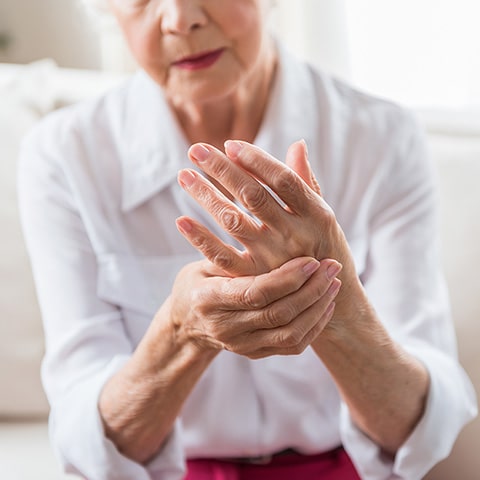Osteoarthritis is believed to affect approximately 10% of the English population. The risks increase with advancing age and this condition affects a large majority of over 70 year-olds. What causes osteoarthritis? Can it be prevented or slowed down? What treatments are available and how is it diagnosed? Senior Home Plus can answer your questions and provide advice.

Causes and risk factors:
Osteoarthritis typically develops over time due to a combination of factors, including:
- Age: The risk of developing osteoarthritis increases with age, as the body's natural ability to repair and maintain joint structures diminishes over time.
- Previous joint injury: Injuries to joints, such as fractures or ligament tears, can increase the likelihood of developing osteoarthritis later in life.
- Obesity: Excess weight puts added stress on weight-bearing joints, such as the knees and hips, accelerating the breakdown of cartilage.
- Genetics: There may be a genetic predisposition to osteoarthritis, with certain individuals inheriting a susceptibility to the condition from their parents.
- Joint overuse: Repetitive stress on joints from activities such as sports or manual labor can contribute to the development of osteoarthritis.
Need help finding a care home for someone living with osteoarthritis?
If osteoarthritis is causing ongoing pain, stiffness or reduced mobility and daily activities are becoming harder to manage at home, finding a suitable care home can help provide comfort and practical support. Senior Home Plus helps families explore care home options across the UK that are adapted to mobility limitations and changing levels of independence.
Get guidance on finding a care homeFree guidance • No obligation
Symptoms of osteoarthritis:
Find YOUR ideal care home NOW!
The signs and symptoms of osteoarthritis can vary from person to person but often include:
- Joint pain: Persistent or intermittent pain in affected joints, typically worsened by activity and relieved by rest.
- Stiffness: Reduced flexibility and stiffness in joints, particularly in the morning or after periods of inactivity.
- Swelling: Inflammation and swelling around affected joints, leading to discomfort and limited mobility.
- Joint instability: Feeling of joint instability or weakness, making it difficult to perform daily activities.
- Limited range of motion: Difficulty moving joints through their full range of motion, resulting in stiffness and functional limitations.
Management and treatment:
While there is no cure for osteoarthritis, various treatment options and management strategies can help alleviate symptoms and improve overall function. These may include:
- Medications: Pain relievers, anti-inflammatories, and corticosteroid injections may be prescribed to manage pain and inflammation.
- Physical therapy: Tailored exercise programs can strengthen muscles, improve joint flexibility, and enhance overall joint function.
- Lifestyle modifications: Maintaining a healthy weight, practicing joint-friendly activities, and using assistive devices can help reduce stress on affected joints.
- Surgical interventions: In severe cases, joint replacement surgery may be recommended to alleviate pain and restore mobility.
Osteoarthritis Symptoms & How to Manage Them
| Symptom | Description | Management Strategy |
|---|---|---|
| Joint Pain | Persistent or intermittent pain in affected joints. | Use pain relievers, heat/cold therapy, and rest after activity. |
| Stiffness | Reduced flexibility, especially in the morning. | Perform gentle stretching and low-impact exercises. |
| Swelling | Inflammation around joints, leading to discomfort. | Apply ice packs, take anti-inflammatory medications. |
| Joint Instability | Weakness, making movement difficult. | Use supportive braces, canes, or physical therapy. |
| Limited Range of Motion | Difficulty moving joints through full motion. | Engage in water therapy or assistive mobility exercises. |
Osteoarthritis is a common and often debilitating condition that affects many seniors, but it doesn't have to define their quality of life. By understanding the causes, recognizing the symptoms, and implementing appropriate management strategies, elderly individuals can effectively manage osteoarthritis and continue to lead active and fulfilling lives.
FAQ: Osteoarthritis in Seniors
What is osteoarthritis?
Osteoarthritis is a degenerative joint disease where cartilage breaks down, leading to pain, stiffness, and limited movement.
What are the main symptoms of osteoarthritis?
Joint pain and swelling
Morning stiffness
Limited flexibility & range of motion
Joint instability or weakness
What causes osteoarthritis?
Aging (natural wear and tear)
Obesity (extra stress on joints)
Previous injuries (fractures, ligament tears)
Repetitive joint use (sports, manual labor)
Can osteoarthritis be prevented?
While not completely preventable, maintaining a healthy weight, avoiding joint injuries, and staying active can reduce the risk.
How is osteoarthritis diagnosed?
Doctor’s physical exam
X-rays (to check for joint damage)
MRI scans (for severe cases)
Blood tests (to rule out other conditions)
What are the best non-medical treatments for osteoarthritis?
Exercise (walking, swimming, yoga)
Hot/cold therapy (heat for stiffness, ice for swelling)
Physical therapy for muscle strengthening
Assistive devices (braces, canes)
Are there medications to treat osteoarthritis?
Pain relievers (acetaminophen, NSAIDs)
Corticosteroid injections for severe cases
Hyaluronic acid injections for joint lubrication
When should surgery be considered for osteoarthritis?
If severe pain and stiffness make daily activities difficult, joint replacement surgery (hip or knee) may be recommended.
Can diet help manage osteoarthritis symptoms?
Yes! A diet rich in Omega-3 fatty acids, vitamin D, and antioxidants can reduce inflammation and support joint health.
Do care homes offer osteoarthritis management?
Yes, specialized care homes provide physical therapy, pain management, fall prevention programs, and mobility support for seniors with osteoarthritis.
Need help finding a care home?
Senior Home Plus offers free personalized guidance to help you find a care facility that suits your health needs, budget, and preferred location in the UK.
Call us at 0203 608 0055 to get expert assistance today.
Do you need a care home for yourself or your loved one?
Search for Care Homes by Region in the UK
| East Midlands | Eastern | Isle of Man |
| London | North East | North West |
| Northern Ireland | Scotland | South East |
| South West | Wales | West Midlands |
| Yorkshire and the Humber |

